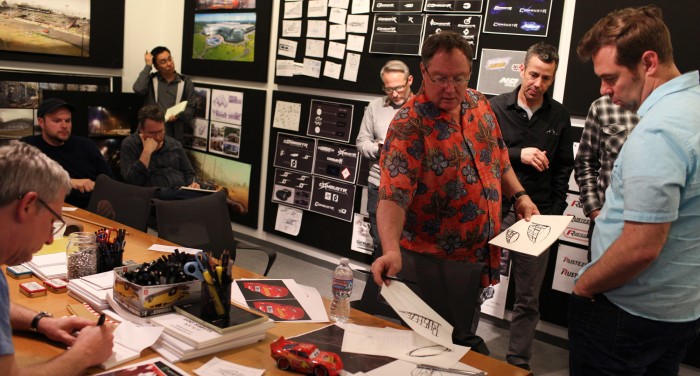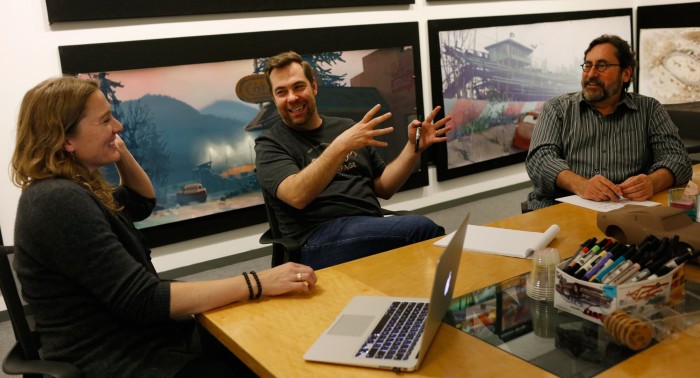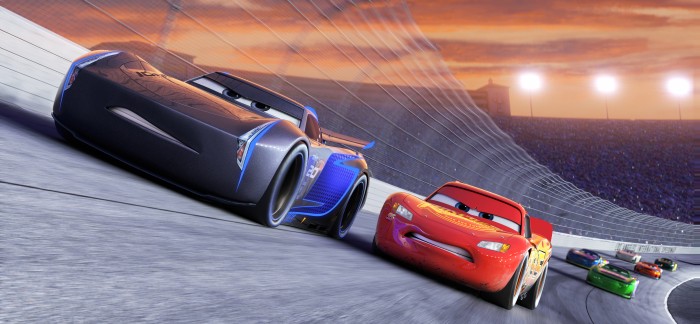'Cars 3' Interview: Director Brian Fee On The Story's Evolution, Improvisation In Animation & More
Finishing up our coverage of Cars 3 (at least until the movie hits theaters this summer), we have a one-on-one interview with the film's director Brian Fee. Unlike most directors at Pixar Animation who have taken on a short film before heading into feature territory, Fee jumped straight from being a storyboard artist on the first two Cars films (as well as WALL-E and Ratatouille) right into the director's chair, with no experience directing whatsoever. That's something we talk about in our interview, along with how the story of Cars 3 evolved, whether there's room for improvisation in an animated movie, and much more.
Most of the time, a Pixar director usually works on one of their short films before directing a feature. How did this happen, and why was Cars 3 the movie that got you into the director's chair?
That's a good question, and it's probably not what you think. I don't know what you think. Yeah, I've never directed anything. But I did work with John [Lasseter] very closely, and I worked with Andrew Stanton very closely on WALL-E. I worked with John on both Cars movies, and I was in development working on this one. I was literally tapped on the shoulder and asked – well, told – John wants to see you. Okay. What, now? Now. Uhhh, okay.
So I walked to John's office, I had no idea, this was just out of the blue as far as I was concerned. I walked into John's office and that's when he said, "You're gonna direct Cars 3." Ed Catmull [president of Pixar and Walt Disney Animation Studios] was sitting next to him, and Catmull leans over and says, "Now we realize we're not actually asking. We know that." [Laughs] That was quite a moment, because I was completely honored that they would trust me with the story, and super honored to be able to continue to find the story. Because this was early on in the process when it wasn't locked up yet story-wise. But also terrified, because I've never directed anything before. It's kinda hard to do. I've watched other directors very closely and it's a hard job. It's always a hard job. It doesn't matter how many movies you've directed, every one is super hard. So how much harder would it be to not even know how to do it? I had a lot to learn. So you can excuse yourself, go down the hall to an empty office and scream for 10 minutes, right? And then come out, roll up your sleeves and get to work.
The first thing I did was ask to have meetings with every other director as often as possible to start picking their brains, learning everything I can, taking all the advice I can get, starting with John. He's the first place I went.
 Since you worked on the previous two Cars movies, did they just know you had this passion for the franchise that you could keep it going forward?
Since you worked on the previous two Cars movies, did they just know you had this passion for the franchise that you could keep it going forward?
I don't know the exact answer John would give you there, but I like to think that John recognized from my work that while I didn't know the details of directing, I like to think he saw whatever bones are necessary. I certainly believe he at least knew how much I loved these characters and how much they felt like family to me, how connected I was to the story we were telling. I like to think he trusted me with that story.
Since you're a first-time director, and you just said you had no idea how to direct, what's one of the lessons you've learned throughout this process?
The hardest thing to do is still to figure out the story, because you can never learn your way out of that. But I had the tools because I came from the story department. I knew I had the tools to figure out the story, it's just a matter of time and surrounding yourself with very smart people. That was also a lesson I learned from Andrew [Stanton], surrounding yourself with smart people. When Andrew sat down with me, he said, "It's not your job to have all the answers. It's your job to have the right crew, and it's your job to get them to give you the answers. That's your job." That was a great thing I took from Andrew. It's not my job to do their job for them, it's my job to inspire them. It's my job to just keep at it, whatever it takes 'til we crack this nut, so to speak.
Pete Docter [director of Monsters Inc., Up and Inside Out] gave me wonderful advice. Pete Docter said, "If you look at any of our movies, if you really look at any of our movies through a microscope and try to think about what would happen logically, they'll all fall apart. Every one of them. They won't make any sense. But if you take the audience on a journey, as long as it's entertaining and emotional, they'll follow you." That was great. Basically he was saying don't overthink things. That was great advice. So I was able to catch these little nuggets from everybody.
Now, I didn't know anything about production. I didn't know anything about directing animators. I didn't know anything about lighting. I didn't know anything about directing the art department. But I actually found those things to be not too hard, because it's their job to do great work. There are so many great people, they're experts. It was just my job to make sure they know what the story needs and that everything they're producing, I hold it against one question: is this helping us tell our story? If this is helping us tell our story, great. If it's not helping us tell our story, why, and let's keep at it. I actually found that process, when you think about it in those terms, it can become easy.
 Speaking of that driving Pixar philosophy that "story is king", how did the story of Cars 3 evolve? Did what we'll see in theaters end up being drastically different from the original idea? What are some of the things early-on in the story that didn't come to fruition?
Speaking of that driving Pixar philosophy that "story is king", how did the story of Cars 3 evolve? Did what we'll see in theaters end up being drastically different from the original idea? What are some of the things early-on in the story that didn't come to fruition?
Early on we did not have Cruz figured out as a character, that's for sure. Cruz existed. Cruz was a male character when the story took place in central California. Cruz was a farmer, and it was completely different. [Lightning] McQueen was just on a journey through the central valley of California and he happened upon Cruz and was kinda handcuffed with Cruz throughout the journey.
We always had a mentor story. We always had a mentor story looking at McQueen and Doc's reletionship, and then looking at McQueen and Cruz's relationship. Then the story when through complete different changes where we kept that mentor-ship, but we moved across the country, went to the South and were looking more at McQueen's career as a racer. Cruz eventually became female.
For a while, for a brief while, because we don't leave any stone unturned, we loosened up on the mentor-ship story a bit more and thought of it more as a sports movie with a mentor-ship undercurrent still present. That wasn't working, so the mentor-ship kept coming up. The movie was basically saying [Whispers] "I'm a mentor." That's the core of the story, so what we're finally coming up with is standing on the shoulders of all that evolution in the process.
Were there any movies that you were looking to as far as influence? This definitely has a comeback story feel, with flairs of an underdog story and the mentor-ship obviously, so were there specific movies and scenes from those movies that you used to guide the visual grammar of the story and whatnot?
We watch a lot of stuff. We watched a lot of mentor movies. We also love sports movies. That's actually how we got Mike Rich as a writer, because we were looking at sports movies. Writing movies like Secretariat, these great underdog sports movies, Mike is fantastic at that. And Mike wrote Finding Forrester, which is also a wonderful mentor story. That's actually how we found – we need this guy. This guy knows the world we're playing in and he can bring a lot to it. One of the best things we did was hire Mike onto the film. He really started to set up the movie that we're finally having on the screen.
It seems like there's a dynamic that makes Jackson Storm look like the modern, technologically advanced Millennial and Lightning McQueen is the generation that came before. As someone who is becoming part of the latter generation, how do you see that story playing out in your own life when working in animation when there's a changing of the guard as the medium advances?
Before I even get to technology, I can just talk about the younger people coming in, younger than myself. Just looking back at where I was when I was hired as a story artist and looking at the kids that are coming in now –kids to me because they're half my age – and how good they are. And I think they are way better than I was. I would not have gotten into this company. They would not have ever hired me. Everyone's just so good. So I can kinda feel that, "Oh, they're actually really good," and if I were a story artist right now, I would probably be a little like, "I better figure out how to step up my game if I want to keep my job." So I can relate to that.
Technology-wise, as far as the movie is concerned, the technology we're using for the movie, we usually just think of that as the tools to make it better. But the heart of it all never changes. The heart of the story, all the work we do to find the story is really where the soul of the movie is. The tools will always get better but the process will more or less stay the same, at least currently.
Some of the research we did through NASCAR was how technology is changing in that sport, how technology is changing racing. Drivers spend more time on a simulator than they do real tracks. I was just talking to Ray Evernham [a former racing crew chief and current NASCAR analyst] about this track (the interview took place at Sonoma Raceway in California), and this track is on the NASCAR circuit once. Once in the summer they'll come here in June, and most of the drivers are not familiar with this track. A lot of turns, a lot of elevations, and I asked Ray, "If they only drive it once a year, how do they get good?" Simulators. They will spend all their time in simulators. That's how they learn the track.
 Do you have a voice cameo in Cars 3?
Do you have a voice cameo in Cars 3?
I do not! I do have two voice cameos in the first Cars. Al Oft [the character I voiced in Cars] is in the movie, but we didn't give him a line. [Laughs] It's very kind of John to use my scratch, because when I recorded those lines for Cars they were scratch lines. It was very nice of John to keep those in the film. But I want to find better actors than myself. [Laughs]
Speaking of that, I always wonder, because animation is such a long process and you're working on scenes even before you have the voices recorded, is there room for improvisation? Because these are movies where there's comedy, and you would like the performance to influence the character.
That can happen in scratch. We will do everything in scratch before we hire the "real voice talent" and that's also an opportunity. Whenever you're in a booth, even if it's just your friend who's doing the scratch recording, it's a chance to work on the fly. Now they hear you say that line, it's cumbersome, it doesn't even make sense now that they hear it out loud. What if you tried this? What if you tried that? If you get the right person, they can start playing with it. Bob Peterson is the voice of Chick Hicks [replacing Michael Keaton], he was doing the scratch for it, and it was just so darn funny. Everything he did was funny. Half of what he did was making it up. He kinda knew the gist of what I was looking for, so he would just start playing in that area. He was coming up with stuff that was so funny, and that was the stuff that landed in the movie. That was scratch. Of course, we actually hired Bob to be the voice.
What about when you have someone like Cristela Alonzo who has a background in stand-up comedy and improvisation? I wonder how much freedom she has with that character comedically.
We try a lot of things. Cristela, we recorded a lot with her, because that was a character we weren't gonna find in scratch. Scratch wasn't gonna be that helpful. So we did very little scratch and we would just bring her in. So I guess you could say that she did her own scratch. We were always playing with lines, giving her room. We were all – sometimes myself, sometimes Bob, the writer on her scenes – we'd be throwing her ideas. We kinda found it organically.
***
That's all from my interview with Brian Fee, but we do have an answer to one more question that we'll be holding back for a little while since it will be an entry in one of our /Answers features coming up around the time that Cars 3 hits theaters on June 16. Stay tuned for that!
